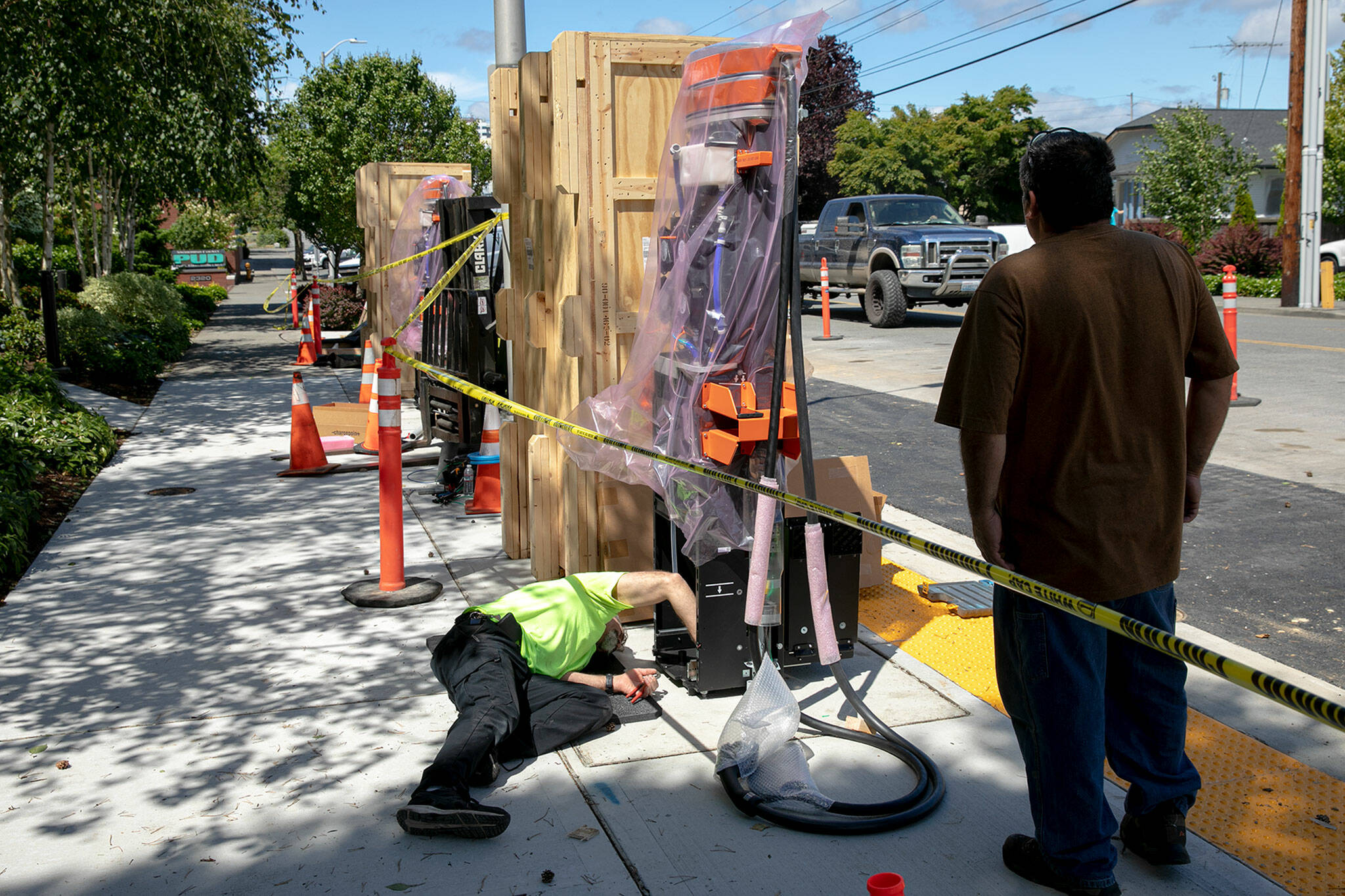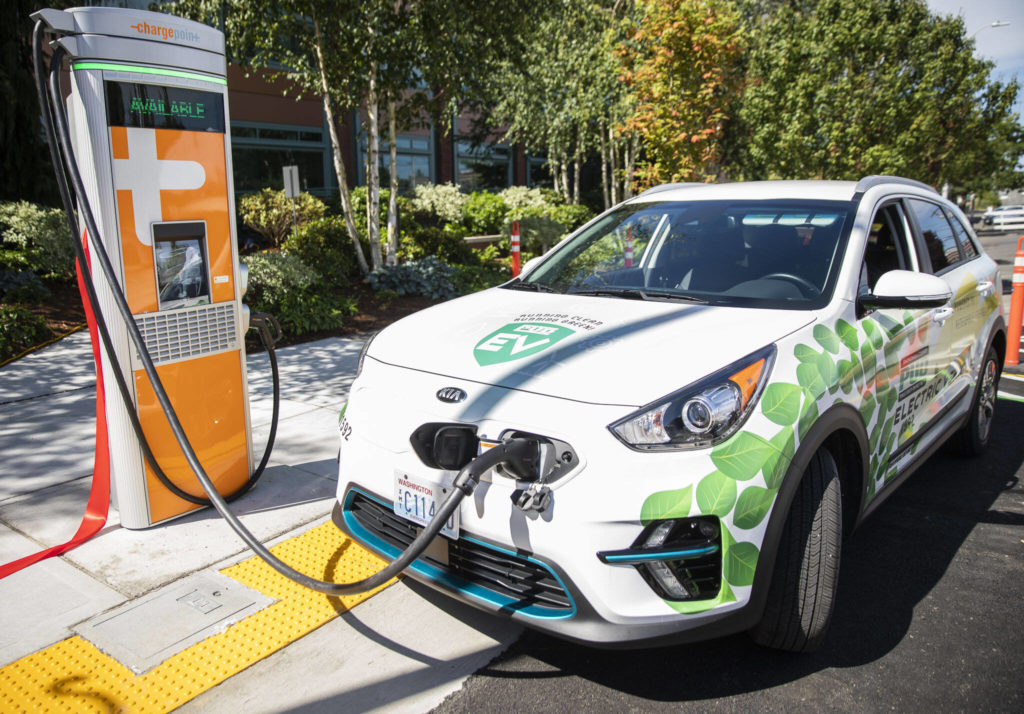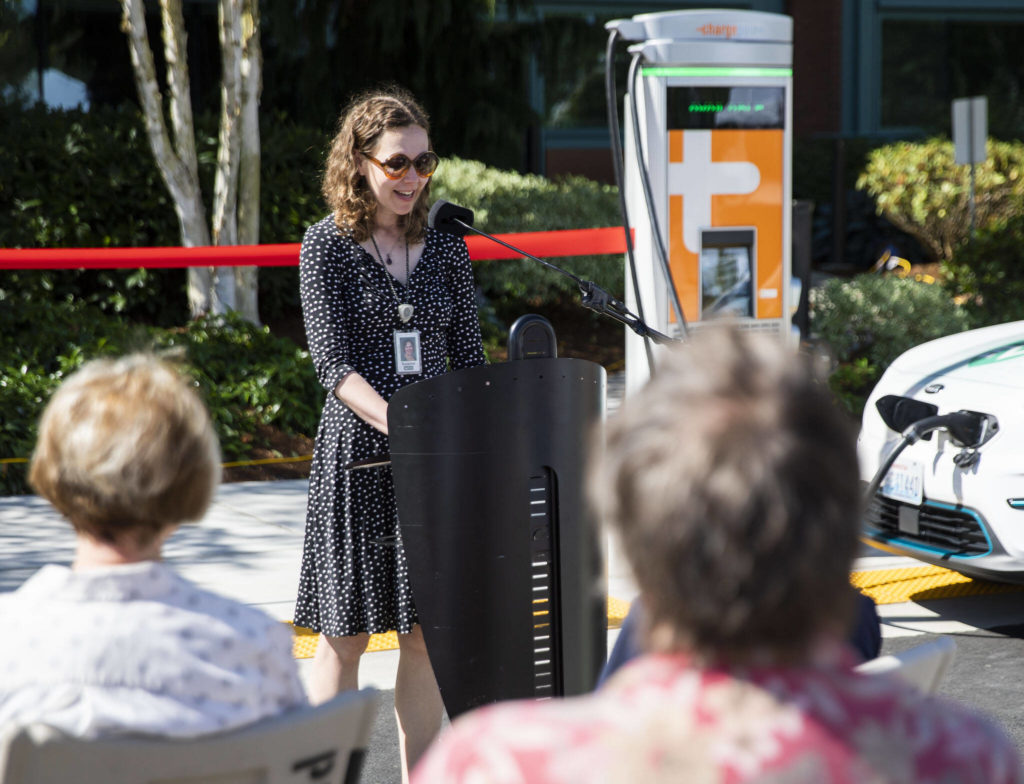EVERETT — A little later and more expensive than initially envisioned, the first public electric vehicle fast-charging stations near downtown Everett are almost ready.
Snohomish County Public Utility District (PUD) commissioners and employees, state Department of Ecology staff, and city representatives celebrated the chargers’ installation Wednesday.
They won’t be energized for public use until a circuit breaker is installed as a failsafe by the end of the month, if not sooner, PUD staff said.
The location in front of the agency where most of the county gets its power was chosen as a crossroads for travelers. It’s near I-5 and U.S. 2, just a few blocks from Everett’s downtown.
“Personally, it’s causing me to think even more hard if we need an (electric vehicle),” PUD CEO John Haarlow said.
Drivers can fully charge their battery in 30 to 60 minutes from the new ChargePoint stations, the first public Level 3 chargers in the county. They need to swipe a card or use an app to pay ChargePoint, a private charging network. After a minimum amount of charging is met, the PUD will get money, project manager Suzy Oversvee said.
It costs 43 cents per kilowatt hour and 40 cents per minute after 10 minutes idly plugged in. The idle rate encourages drivers to not leave their car too long.
Construction and electrical work cost over $226,000, and the two stations cost $118,994, according to PUD documents.
A little less than half, over $150,000, came from the state Department of Ecology’s portion of the Volkswagen emissions cheating settlement. The PUD matched the grant with $38,500.
Reducing fossil fuel emissions from transportation is one pursuit for climate action in Everett, which has electrified its transit fleet and is looking to make a similar transition for its city vehicles. Getting residents to swap their internal combustion engine cars for zero emission vehicles is another angle.
“Drivers need to know they can drive and charge up as conveniently as gas cars,” Mayor Cassie Franklin said.
Snohomish County has the second-most registered electric vehicles in the state with 11,045. King County leads with 52,810, according to state Department of Licensing data.
The two stations are along California Street between Rainier and Virginia Avenues, adjacent parallel parking spots. The city changed the parking restriction there to 90 minutes for electric vehicle charging.
The PUD had the road raised to the curb and sidewalk height, which makes it more accessible for someone with a mobility limitation driving an electric vehicle. The stretch of curb is lined with tactile plates for blind and vision-impaired people.
Most electric automobiles can use the stations, though Teslas need an adapter for the CCS and CHAdeMO connectors. Some PUD employees have tested the new ChargePoint stations with a Ford Focus, Nissan Leaf and a Kia Soul.
Oversvee’s Focus reached 90% of its battery capacity quickly, then slowed to a “trickle” rate, which she said is common to avoid stressing the batteries. Even at that rate, she had about 120 miles of range.
An employee’s Tesla was one of the most expensive to fully charge to around 300 miles for about $40. That’s still cheaper than a tank of gas.
“We really want to make sure these are dependable and accessible,” Oversvee said.
It adds to a growing network of chargers open to the public.
The U.S. Department of Energy lists 1,652 electric vehicle public charging station locations in the state.
Snohomish County has had a pair at the Evergreen State Fairgrounds near the administration building since 2012. They’re slower than the PUD’s but free to use. People can pull up and plug in without swiping a card to energize their car.
The county also has public chargers at the Snohomish County campus in Everett and at Willis Tucker Park near the parks admin office.
Everett Community College has six charging stations at its main campus along Broadway. Those were installed in 2012 and upgraded last fall through grant funding, college spokesperson Katherine Schiffner said. Anyone can use the chargers, which are part of the Blink network, if they pay.
Mukilteo installed a pair of charging stations made by Sema Connect at Lighthouse Park. The energy from them is free to whoever plugs in, but the parking spots require the same $2.50 hourly rate as the other spaces in that part of the city.
The PUD is working with Housing Hope to install two charging stations at HopeWorks Station on Broadway in Everett. The building offers housing, job training and social services for people who are homeless or in poverty.
Putting in Level 2 and DC fast charging stations there could remove a barrier for someone to buy an electric vehicle and for customers at Kindred Kitchen. It could be ready by September.
Ben Watanabe: 425-339-3037; bwatanabe@heraldnet.com; Twitter: @benwatanabe.
Talk to us
> Give us your news tips.
> Send us a letter to the editor.
> More Herald contact information.



























